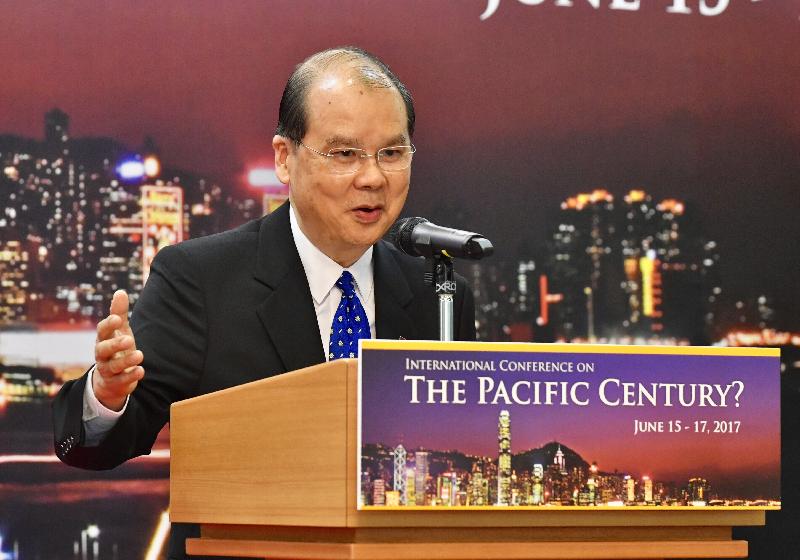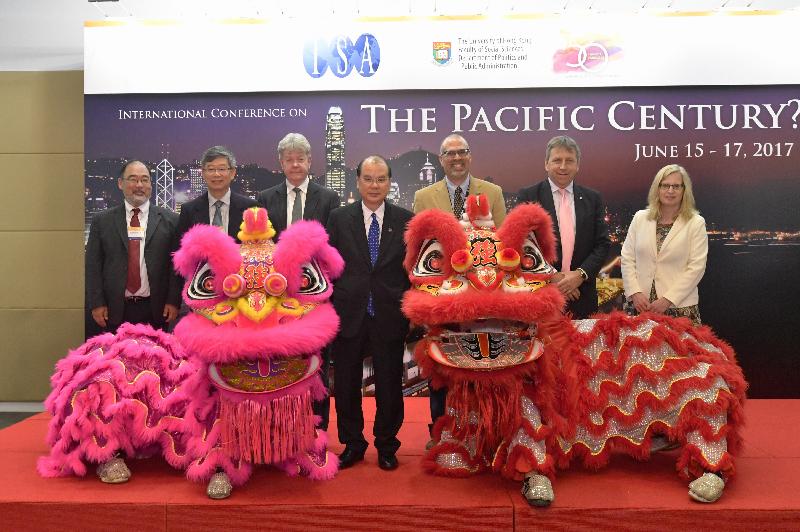Speech by CS at International Studies Association International Conference (English only) (with photos)
******************************************************************************************
Professor Mathieson (President and Vice-Chancellor of the University of Hong Kong (HKU), Professor Peter Mathieson), Professor Hu (Chairman of the Local Organisation Committee of the International Studies Association Conference 2017 - Hong Kong and Head of the Department of Politics and Public Administration of HKU, Professor Richard Hu), Professor Burns (Dean of the Faculty of Social Sciences of HKU, Professor John Burns), distinguished guests, ladies and gentlemen,
Good evening. It is my honour to join you all today at the high-powered International Studies Association (ISA) International Conference.
This year, nearly 1 000 professors and graduate students, independent scholars and researchers, policy experts and related professionals gather here for a three-day conference to discuss international issues under the theme of "The Pacific Century?".
It is a strikingly apt and timely theme, though I would like to offer a modest suggestion to remove the question mark after "Century" and replace it with an exclamation point.
Indeed, it is a century for the Pacific region to shine, and Hong Kong is well placed and well prepared to make it happen.
To outline the reasons for our confidence in Hong Kong's future, let me begin with the past. Twenty years ago, Hong Kong was reunited with our Motherland, becoming a Special Administrative Region of our nation. Your presence here certainly enhances our 20th anniversary celebrations.
Since reunification, we have made remarkable progress in the economy and, no less, in improving the livelihood and social development of the people of Hong Kong. Over the past two decades, our gross domestic product has increased by more than 80 per cent in real terms. Last year, our full-time employees earned 36 per cent more than in 1997, after discounting for inflation. Indeed, our labour market has been in a state of full employment since mid-2011.
Consider as well the substantial stock of external direct investment in Hong Kong. At the end of last year, it reached some US$1.8 trillion. That, ladies and gentlemen, works out to be more than seven times our stock in 1998 - the earliest date on which comparable data were available. How many economies today can make that claim?
Our success over these two decades as a Special Administrative Region is rooted in the "one country, two systems" framework that governs Hong Kong. It gives us the freedom to expand our ties with the world - economically, politically and culturally. It also blesses Hong Kong with a singular advantage to link our economy ever more deeply with that of our Motherland and the global market at large.
Hong Kong has become the first mover in the continuing financial liberalisation of the Mainland of China. In 2004, Hong Kong pioneered the offshore Renminbi (RMB) business. Today, we are the global hub for RMB trade settlement, financing and asset management. Hong Kong boasts the world's largest offshore RMB liquidity pool and manages some 75 per cent of the world's RMB payment transactions.
The Shanghai-Hong Kong Stock Connect commenced operation in 2014. It was followed, last December, by the launch of the Shenzhen-Hong Kong Stock Connect. Together, they are opening up capital markets between Hong Kong and the Mainland. And they will soon be joined by the Bond Connect, which will give overseas investors access to the Mainland interbank bond market for the very first time.
We are, in short, both China's international financial centre and the world's China financial centre. We are the Mainland's International financial centre with excellent connectivity and infrastructure, free flow of information, talent and capital backed by the rule of law and an independent judiciary system guaranteed by the Basic Law under the principle of "one country, two systems". These are part and parcel of our "super-connector" role to bring the Mainland and global business and investment together.
That unique capability can only mean opportunity, particularly with the Mainland's far-reaching Belt and Road Initiative now gaining momentum. Inspired by two legendary economic corridors of ancient times, namely the Silk Road Economic Belt and the 21st Century Maritime Silk Road, this visionary initiative aims to enhance policy co-ordination, connectivity, trade, financial integration and people-to-people links amongst over 60 nations. Covering 4.4 billion people and accounting for over 30 per cent of global economic value, the Belt and Road Initiative will surely create huge and fresh opportunities. Last year, Mainland China's direct investment in Belt and Road countries amounted to HK$112 billion (US$14.5 billion).
The Central People's Government has made it clear that Hong Kong is expected to play a key role in the Belt-Road initiative. Hong Kong has become a member of the Asian Infrastructure Investment Bank (AIIB) and we are set to work with the AIIB in financing and building the future for the Belt and Road endeavour. Last year, for the second year in a row, we were ranked first globally in terms of funds raised through initial public offerings. The funds so raised amounted to over HK$195 billion (US$25 billion). We are also the world's largest offshore RMB hub, processing over 70 per cent of RMB payment transactions worldwide. With our financial service capacity and professional services expertise, we are well positioned to serve as a fund-raising and project management hub for infrastructure projects in countries along the Belt and Road corridors.
Connectivity is critical to this ambitious multilateral initiative. The Hong Kong International Airport has been the busiest cargo airport in the world for the past seven years and is the world's third busiest international passenger airport. Half the world's population is no more than five hours' flying time from Hong Kong, while all Asian major markets such as Shanghai, Singapore, Seoul and Tokyo are less than four hours' flight away. Our airport is serviced by more than 100 airlines which operate over 1 100 flights a day, linking Hong Kong to about 190 destinations worldwide and some 50 cities in China. To ensure that Hong Kong remains a regional aviation hub, the Airport Authority is building the third runway which is expected to commence operation in 2028.
Furthermore, the 142-kilometre-long Guangzhou-Shenzhen-Hong Kong Express Rail Link (XRL) will form part of the national high-speed rail network and link Hong Kong with the Guangzhou South Station through Shenzhen. Upon the commissioning of the Hong Kong section of the Express Rail Link, the journey time between Guangzhou and Hong Kong will be reduced to about 50 minutes, achieving a "one-hour living radius". It will take only eight hours for us to reach Shanghai and 10 hours to Beijing. It is our target for the Hong Kong section of the XRL to commission by the third quarter next year.
The vast and sophisticated infrastructural connectivity being developed by Hong Kong will serve us well as the Guangdong-Hong Kong-Macao Bay Area coalesces. The Bay Area project is a key new element of the Mainland's national development strategy that brings Hong Kong, Macau and nine other major cities in Guangdong together to form a Big Bay Area with a combined population of 66 million consumers.
The joint development plan for the Bay Area is now being prepared. Down the road, it will certainly strengthen Hong Kong's connectivity with the Mainland, while boosting our strategic role in its economy.
In parallel, we are concluding a free trade agreement with ASEAN, the Association of Southeast Asian Nations. We are ensuring that Hong Kong will continue to expand its trade network and strengthen the role as the "super-connector" to the Mainland and the wider Asian region.
This century is the Pacific century. We are determined to be at the fast-beating heart of it.
I have one further thought regarding the "Pacific century" theme. The word "Pacific" means more than the name of our greatest ocean and the economies it embraces. It also suggests resolving differences through peaceful means.
In reflecting on that, I can think of no better example than the Belt and Road Initiative that I mentioned earlier. It is an ambitious plan to create prosperity for a wide area of the world, and its central goal is co-operation rather than confrontation.
Last month, President Xi Jinping welcomed some 30 heads of state to Beijing for attending The Belt and Road Forum for International Cooperation. The Forum title says it all. President Xi elaborated in his welcome address that, and I quote, "First, we should build the Belt and Road into a road for peace." He added that while the Initiative was rooted in the ancient Silk Road on Asia, Europe and Africa, it was "also open to all other countries".
Peace and prosperity in our times, from our Motherland, through Asia and the Pacific, and to the world at large. It is a message of hope and promise. And I am confident that it will attract a world of interest.
I would like to thank again the ISA and the University of Hong Kong for organising this important gathering.
We are all, in one way or another, students of international studies of global affairs and domestic relations. That certainly is true of Hong Kong, given our international dimension and close links with Mainland China and Asia. We look forward to your constructive discussion and valuable insight into a wide spectrum of international issues over the next three days.
I wish you a fruitful conference and a memorable stay in Hong Kong.
Thank you.
Ends/Thursday, June 15, 2017
Issued at HKT 19:08
Issued at HKT 19:08
NNNN




